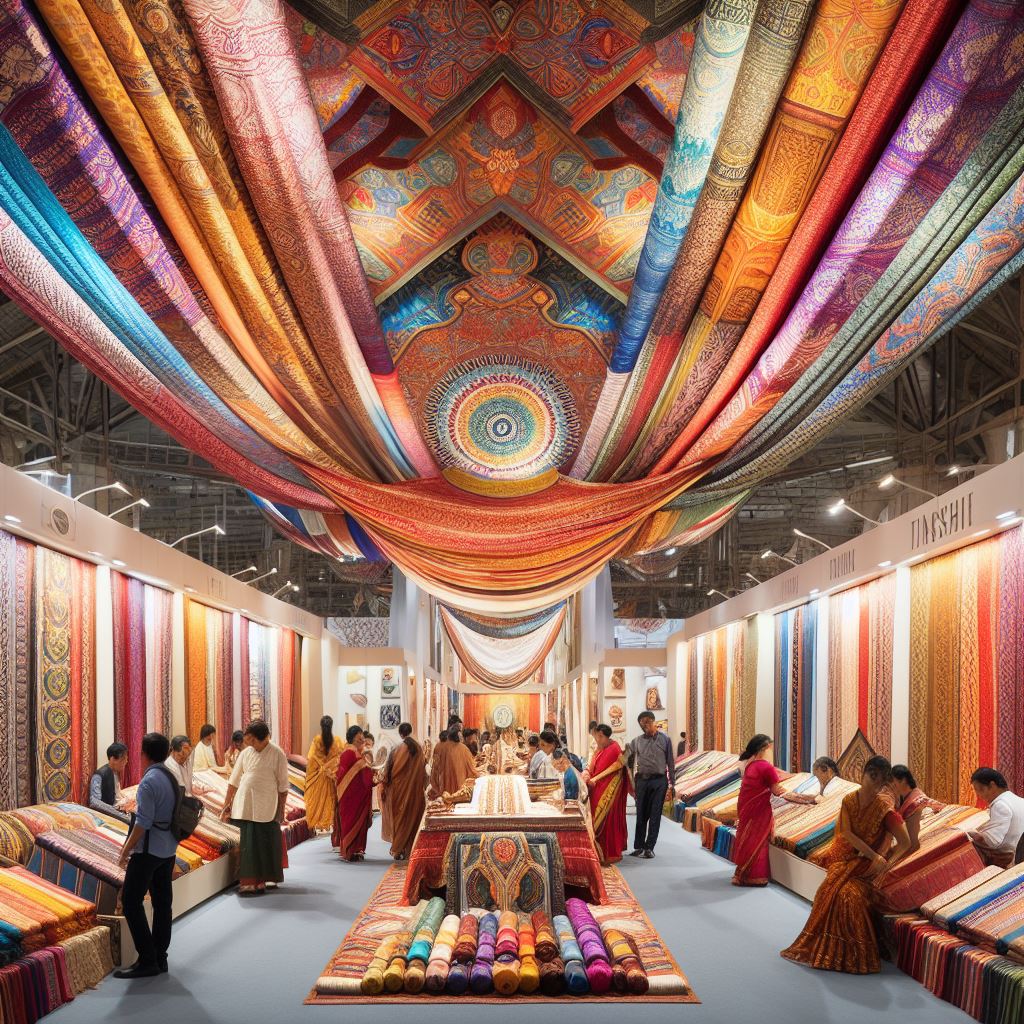Understanding the logistics of sourcing organic textiles from India is fundamental for a smooth supply chain operation. Ensuring timely deliveries while maintaining the integrity of the organic product through eco-friendly transportation and storage is a critical consideration.
Businesses need to be aware of the logistical nuances, such as the local infrastructure, regulatory requirements for export, and the various modes of transport that align with eco-friendly practices. Leveraging India’s well-established logistics network can lead to efficiency and cost-effectiveness in the transportation of organic textiles.
Points to Consider in Logistics:
- Selecting the right freight and shipping partners who align with your sustainability goals.
- Understanding customs regulations to avoid delays and additional costs.
- Ensuring packaging is eco-friendly and aligns with the organic nature of the textiles.
Key Takeaways: Organic Textile Sourcing in India
| Key Point | Description |
|---|---|
| Stringent Criteria | Ensure suppliers adhere to international organic certifications and ethical practices. |
| Supplier Relationships | Build long-term relationships based on shared sustainability goals to ensure trust and quality. |
| Overcoming Challenges | Anticipate and mitigate challenges with a dynamic and informed approach to supply chain management. |
| Industry Innovation | Embrace technological advancements and industry trends to maintain a competitive edge. |
| Making a Difference | Contributing to sustainability through ethical sourcing practices reflects positively on brand value and supports global sustainability efforts. |
Marketing Indian Organic Textiles on the Global Stage
As global awareness of the importance of sustainable sourcing grows, the marketing of Indian organic textiles has become more viable than ever. These products not only resonate with the environmentally conscious market but also appeal to those appreciative of India’s vibrant cultural heritage.
To maximize the impact, your marketing approach should highlight the organic and ethical aspects of your textiles while weaving in the narrative of India’s rich textile heritage. Storytelling can be a powerful tool here, allowing potential customers to connect with the process and people behind the product.
Marketing Tips:
- Emphasize the unique story behind each organic textile product.
- Use certification labels and sustainability scores to build trust.
- Create campaigns that speak to the environmentally conscious consumer.

Adapting to Industry Trends: The Shift to Organic Materials
The textile industry is undergoing a paradigm shift towards organic materials, driven by consumer demands for more sustainable options. Indian suppliers are not just adapting but also actively innovating to meet these shifting preferences.
It is important for businesses sourcing textiles to stay aware of these trends and to adapt their sourcing strategies accordingly. Companies that can quickly align with new industry standards are those that will carve out a competitive edge in the marketplace.
Trends to Watch:
- The rising use of organic blends with traditional textiles.
- Technological advancements in sustainable fabric production.
- Growing emphasis on transparency across the supply chain.
Navigating Legal and Trade Considerations in eco-friendly sourcing
Legal compliance and trade regulations are critical components of sourcing from India. Familiarity with the local laws regarding organic certification, labor practices, and export incentives can greatly affect the success of your sourcing strategy.
When it comes to sourcing organic textiles, one must also consider the international legal framework that governs eco-friendly products. Compliance ensures smooth transactions and reinforces your reputation as a responsible business.
Areas of Legal and Trade Compliance:
- Organic certification requirements and their legal implications.
- Labor laws and regulations impacting textile manufacturing.
- Export duties and taxes associated with organic textiles.
Technologies Revolutionizing the Organic Textile Sector
Technological innovations have the power to revolutionize the organic textile sector, making processes more efficient and transparent. From advancements in organic dyeing techniques to the use of Blockchain for verifying the authenticity of organic claims, technology is at the forefront of this change.
Integrating these technologies into the sourcing process not only enhances product quality but also ensures a transparent and traceable supply chain which is critical for maintaining consumer trust in the organic label.
Innovative Technologies to Explore:
- Blockchain for traceability and certification verification.
- AI for predicting trends and optimizing inventory management.
- Automation in textile production for increased efficiency and sustainability.
Building Long-Term Relationships with Organic Textile Suppliers
The foundation of a successful sourcing venture is grounded in building robust, long-term relationships with suppliers. These partnerships go beyond transactions, encompassing shared values and a unified vision for sustainable business practices.
Committing to a collaborative approach, where both buyer and supplier work towards common goals, leads to a fruitful sourcing relationship that is both sustainable and rewarding for all parties involved. Cultivate these relationships with continuous engagement and mutual growth strategies.
Strategies for Strengthening Supplier Relations:
- Regular communication and updates on market trends and consumer preferences.
- Joint development of new organic textile products or innovations.
- Shared initiatives or programs that promote sustainability and social responsibility.
Learn more about vendor management in India
Overcoming Challenges in the Organic Textile Supply Chain
Challenges in sourcing organic textiles can range from fluctuating material availability to navigating the complexities of a global supply chain. Anticipating these challenges and developing contingency plans are essential for a smooth sourcing experience.
To deal with these potential hurdles, businesses need to foster relationships with various stakeholders, maintain flexibility in their operations, and be mindful of the changing dynamics of the industry.
Common Supply Chain Challenges:
- Navigating seasonal variations in organic material supply.
- Ensuring consistency and quality in large-scale orders.
- Coping with the dynamic international trade environment.
Case Studies: Success Stories of Sourcing Organic Textiles from India
Nothing underscores the potential of organic textile sourcing in India better than actual success stories. In a series of illuminating case studies, we have seen businesses from around the globe successfully partner with Indian suppliers to create high-quality, sustainable product lines that have resonated profoundly with consumers.
These case studies reveal the ingenuity of Indian suppliers in producing exceptional organic textiles and the fruitful collaborations that have led to significant sustainability milestones. Businesses can draw inspiration and strategies from these examples that highlight the successful integration of traditional Indian textiles with modern sustainability demands.
Excerpts from Case Studies:
- A fashion brand that teamed up with an Indian supplier to create a popular line of organic denim.
- An organic baby clothing company that sourced pesticide-free cotton textiles from an Indian farmer’s cooperative.
- A sports apparel business that enhanced its brand value by using organic Indian bamboo fabrics.
Future Outlook: Organic Textiles Industry in India
The trajectory of the organic textile industry in India shows promising growth and potential for innovation, signifying a bright future. Continued advancements in sustainable practices, coupled with the rising global demand for eco-friendly products, forecast an expanding market space for Indian organic textiles.
Amid these prospects, the commitment from both suppliers and buyers to uphold ethical and environmental standards will be pivotal. Staying ahead of industry trends and consumer preferences while embracing new technologies will define the leaders in this arena.
Projections for the Future:
- Continued growth in demand for organic textiles worldwide.
- Increased investment in sustainable textile technologies and innovations.
- A stronger focus on ethical and eco-friendly business practices in the supply chain.
Conclusion: Making a Positive Difference with Organic Textiles Sourcing
Sourcing organic textiles from India is not just about business transactions—it is about contributing to a global movement towards sustainability. It is an opportunity to make a positive difference in the world while fostering growth and innovation in your business.
By following the insights provided in this comprehensive look at organic textile suppliers in India, your business can benefit from the high-quality, sustainable textiles that Indian suppliers offer. Moreover, you’ll be investing in an environmentally conscious future, enhancing your brand’s reputation, and supporting the livelihood of local communities.
We believe in a future where organic textiles are not a mere option but a default choice for consumers and businesses alike. By identifying and partnering with the right suppliers, we reach closer to that sustainable future.
For an in-depth understanding of product sourcing strategies and how to make the most of your sourcing endeavors, explore our resources here:
- Textile Exchange: As a global non-profit that works closely to drive industry transformation in preferred fibers, standards, and responsible supply networks, Textile Exchange offers extensive resources on organic textiles and related certifications.Visit Textile Exchange
- The Organic Cotton Accelerator (OCA): Dedicated to organic cotton, the OCA is a multi-stakeholder organization that focuses on creating a prosperous organic cotton sector that benefits everyone from farmer to consumer.Learn More about OCA
- The Fair Trade Certified: Fair Trade USA is an independent, non-profit organization that sets standards, certifies, and labels products that promote sustainable livelihoods for farmers and workers and protect the environment.Discover Fair Trade Certified Textiles
FAQ: Sourcing Organic Textiles from India
Q: What makes a textile ‘organic’ in India? A: An organic textile must be made from materials that are grown without the use of harmful pesticides or chemicals; the entire process, from farming to finishing, should be environmentally and socially responsible, often verified by certifications like GOTS and OEKO-TEX.
Q: How can I ensure the textiles I source are genuinely organic? A: Look for suppliers with reputable organic certifications, perform regular audits, and maintain transparent communication to verify the supply chain’s organic integrity.
Q: What are the benefits of sourcing organic textiles from India? A: Sourcing from India offers a diverse range of high-quality organic materials and the opportunity to partner with suppliers rooted in a rich heritage of textile craftsmanship while benefiting from a robust sustainable sourcing network.
Q: Are there specific challenges to sourcing organic textiles from India? A: Yes, challenges include ensuring consistent quality in large-scale orders, logistical intricacies, and navigating both Indian and international trade regulations focused on sustainability.
Q: What does the future hold for the organic textile industry in India? A: The Indian organic textile industry is projected to grow considerably, driven by sustainable innovation and heightened global demand for eco-friendly products.






